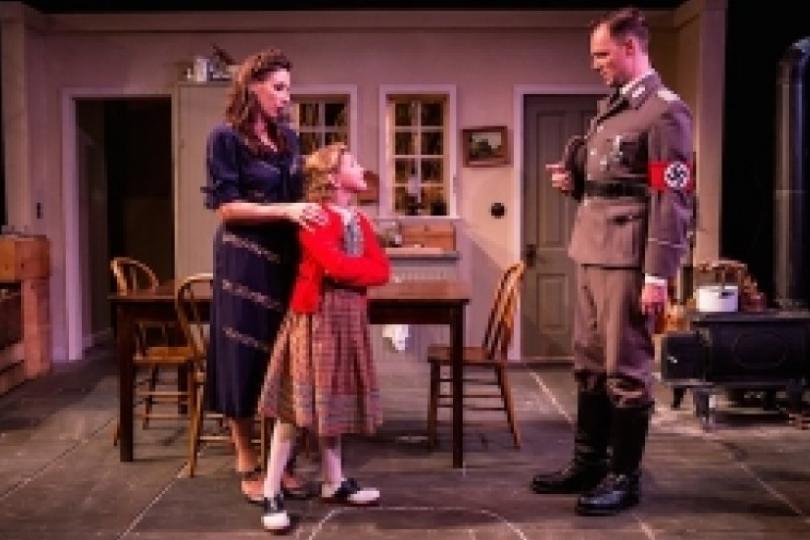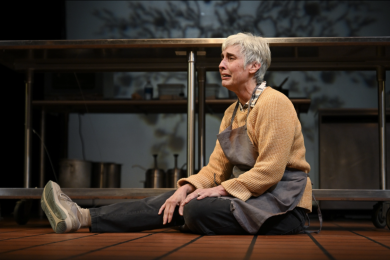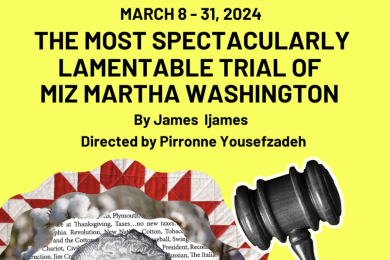Editor's Note: You can invest to MinnesotaPlaylist's rebirth until Tuesday over at Indiegogo.
The mood is dark as
Gabriel opens. Ten-year-old Estelle has snuck downstairs with a candle to draw a “square of power” on her kitchen floor. As she deliberately chalks out the boundaries of her spell, the audience is raptly attentive, situating ourselves in the grim world of an isolated house on the Nazi-occupied Island of Guernsey in the middle of a world war.
The start of Moira Buffini’s play sets us up for a darkly funny historical drama. The characters are all poised on the edge of a great tragedy: desperate mother Jeanne Becquet has her manipulative claws out as she attempts to ingratiate herself with Major Von Pfunz, who commands the local occupying forces, while Jeanne’s daughter-in-law Lily is struggling to keep her Jewish identity a secret from the Germans. And Estelle, who missed the boat with the other child evacuees, is left alone with her mystical imagination and spell casting to make sense of the war.
But all reasonable adults will tell you that a square is the wrong shape for a protection charm. As the housekeeper Margaret Lake points out, a square (unlike a circle) leaks at the corners – and just like Estelle’s square of power, the house itself reveals itself to be permeable and profoundly vulnerable to the outside world. The front door rarely ever stays closed for long, and it seems that each time someone enters or exits, the drama of the war outside insinuates itself deeper into the Becquet family’s life.
Enter melodrama
The catalyst for the action (and title character) is also dragged in through the front door, but he brings a different sort of mood with him. When Lily rescues a mysterious, naked man who has washed up on shore with no memory of his past, she brings an element of melodrama into the house that is incongruous with the dark tone Buffini has led us to expect. Our focus shifts to the mystery of the man’s identity rather than the historical and interpersonal tensions at play, and the consequences of his arrival bring the action to a climax that would feel more at home in a soap opera than a historical piece.
As a plot device, the stranger (whom Estelle names Gabriel) is an interesting choice. As the members of the Becquet household project their own fears and desires onto him, Gabriel serves as a lens that brings all of the other characters into sharper focus. The trouble is that the Walking Shadow’s production is so skillfully realistic that Gabriel’s obvious white-clad symbolism of innocence feels like a page from the wrong book.
The historical accuracy of the production is wonderful, beginning with Steve Kath’s detailed set and the players’ use of a real oil lamp to provide some of the lighting. The nuance of the acting also makes the evening both entertaining and provocative. Katherine Kupiecki plays Jeanne Becquet with deep desperation and a shaky sense of morality, but her choices stem from her desire to protect her family; Miriam Schwartz also does a beautiful job distinguishing Lily’s public face from her private fears. As Estelle, Lily Wangerin provoked plenty of laughs of recognition: although Estelle is the perfect image of a bratty kid, she also has a deep need to feel safe and secure that draws the audience’s sympathies.
Despite being meant to represent the devilish counterpart to Gabriel’s empty-headed goodness, Wade A. Vaughn provides ample shading to his performance as Major Von Pfunz. The role of the Nazi officer could have been cartoonishly evil in different hands, but Vaughn imbues the character with a sick blend of poetry and repressed violence that makes Von Pfunz electrifying to watch.
Whether Gabriel turns out to be an RAF pilot, a shipwrecked SS officer, a sick banker, or even a fallen angel, the character itself doesn’t hold a candle to Von Pfunz’s fascinating, chilling weirdness. Ross Destiche plays the role well, though, and the play even suggests – although this might be pushing the symbolism too hard – that the more Gabriel learns about the world he has woken up in, the more tainted his virtue will become. (I wish the play, or the production, had explored that idea more; it would have convinced me that the character was more than a simple plot device.)
Performances better than the play
I was engrossed by the acting and fully immersed in the production, which was smartly directed and hit all the right notes of humor and tension without ever venturing into hysteria. For all of the company’s skill, however, Gabriel himself still felt superfluous. Performances this good don’t need a deus ex machina to advance the plot or explore ideas like the nature of cowardice and motivations behind cruelty.
Amy Rummenie’s director’s note confesses that the Walking Shadow’s artistic company is basically a group of nerds interested in history, literature, and puzzles. But this is the Walking Shadow’s tenth anniversary season, and their past productions have garnered two Ivey Awards. The company has grown into more than just a bunch of history nerds, and at this point, I think they might be too good for this play.
That said, I had a great time watching this skilled ensemble act the heck out of this script. I’m still not sure what Gabriel’s there for, but the Walking Shadow makes this a play worth watching.





